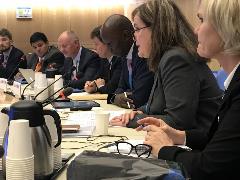Geneva, 26 September 2019 - A 57-member delegation led by the Minister of Health of Iceland, Ms Svandís Svavarsdóttir together with Asta Valdimarsdottir, Secretary General of the Ministry of Health and Dr Anna Lilja Gunnarsdóttir, Special Envoy, Permanent Mission of Iceland to the United Nations Office and other international organizations in Geneva, visited WHO headquarters. The aim of the visit was to learn about the latest regional as well as global trends in the field of digital health, and WHO-led opportunities for knowledge exchange among the Member States and partners working in the field. The delegation was welcomed by Mr Bernardo Mariano, Chief Information Officer of WHO and Director of the Department for Digital Health and Innovation.
 Minister Svavarsdóttir presented an overview of the current state of digital health in Iceland, including an impressive portfolio of digital health solutions implemented under the Icelandic National Digital Strategy 2016-2020. The minister outlined her vision and key priorities for future digitalization of the health system, highlighting that digital technologies are seen in Iceland as key components for increasing access to quality health care.
Minister Svavarsdóttir presented an overview of the current state of digital health in Iceland, including an impressive portfolio of digital health solutions implemented under the Icelandic National Digital Strategy 2016-2020. The minister outlined her vision and key priorities for future digitalization of the health system, highlighting that digital technologies are seen in Iceland as key components for increasing access to quality health care.
Mr. Mariano introduced WHO's newly established Science Division led by Chief Scientist, Dr Soumya Swaminathan. He also presented the mandate and main functions of the Department of Digital Health and Innovation in the context of helping countries to achieve health-related Sustainable Development Goals and the “triple billion targets” underpinning WHO's Thirteenth General Program of Work (GPW13). In his remark, Mr. Mariano highlighted WHO’s commitment to leveraging technologies, including digital health, to contribute to the attainment of the highest level of health for all. He said that the delegation’s visit provides a unique opportunity to identify and work together on common interests and priorities and underscored the importance of collaborative work to advance intersectoral and interdisciplinary efforts for digital health.
 A panel of WHO experts on digital health, Garrett Mehl, Clayton Hamilton, and Sameer Pujari, presented an overview of the WHO Guideline Recommendations on Digital Health Interventions for Health Systems, WHO Digital Health Atlas, regional overview of progress in digital health in the European Region, and the forthcoming WHO Global Digital Health Strategy.
A panel of WHO experts on digital health, Garrett Mehl, Clayton Hamilton, and Sameer Pujari, presented an overview of the WHO Guideline Recommendations on Digital Health Interventions for Health Systems, WHO Digital Health Atlas, regional overview of progress in digital health in the European Region, and the forthcoming WHO Global Digital Health Strategy.
Dr Priit Tohver, Adviser on e-services and innovation at the Ministry of Social Affairs, Estonia, shared enablers, successes and future directions for digital health development in Estonia, and highlighted the importance of employing digital health to solve problems where the shared interests of multiple stakeholders can be met. Dr Indra Joshi, Head of Digital Health AI at the UK’s NHSX, presented UK’s vision for the implementation of Artificial Intelligence in clinical environments and Professor Solange Ghernaouti, University of Lausanne, introduced a risk management approach to address cybersecurity challenges in developing digital health environments.
